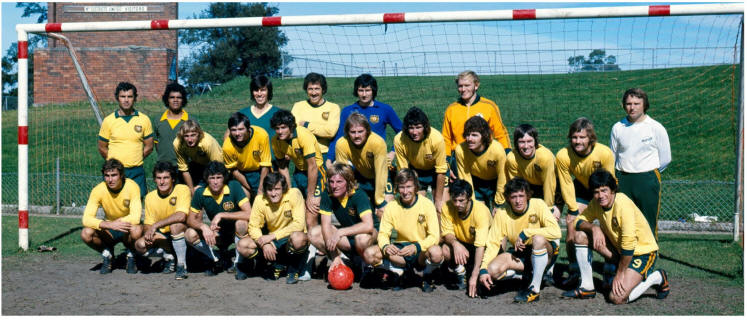 |
The Southern Cross is in a New Design! The Socceroos Australian national soccer team. Australia qualified for the World Cup Finals in Germany in 1974. The reason for the formation of my site. Through these pages, you will remember that time and you will see many pictures from those days. It was the first time Australia has qualified for the men's World Cup Finals. Socceroos ist der Name für die Australische Fußballnational-mannschaft. Er entstand 1974 bei der Fußball Weltmeisterschaft. Diese Seiten, der Grund für die Entstehung der Homepage, werden sich an die Zeit erinnern und Bildmaterial aus diesen Tagen zeigen. Es war die erste und für lange Zeit letzte Teilnahme einer Australischen Mannschaft bei einem Weltturnier. Erst zur WM 2006 kamen die Socceroos zurück nach Deutschland. |
| This website is in english, but you will find also some spare pages or artikles in german | Diese Website ist in englisch, aber ich habe auch einige Seiten auf deutsch erstellt |
|
Australia
is not what you'd call a big soccer nation. The Aussies have tried since
1966 to qualify for the FIFA World Cup - the Football World
Championship, but with next to no success.
Australia
reached the World Cup for the first time in 1974 in Germany. Remember,
the 1974 World Cup Finals involved only 16 teams, not 32 like today.
These pages are dedicated to those 1974 Socceroos - the nickname of
Australia's national football team.
In the team there were players
who earned their wages in the mine, as craftsmen or as sellers.
Defender
Manfred Schaefer delivered milk every morning in the suburbs of Sydney
so he had time for soccer training in the afternoon. The history is in words and pictures, rather than just masses of numbers and statistics. We should remember those times and this marvellous team's successes. We should never forget these heroes. As their exploits fade into history, they should still be an example for the young, and for the money-rich and resource-pampered stars of today. Regardless of when and how often in the future the Socceroos qualify for the World Cup, the first Socceroos to do so were those of the 1974 team who went to Germany. |
Australien ist nicht gerade das, was man eine große Fußballnation nennt. Erstmalig 1966 versuchten sich die Aussies für das große Turnier einer Fußballweltmeisterschaft zu qualifizieren. In einigen Qualifikationen war das Scheitern sportlich tragisch, manchmal war die Mannschaft aber auch einfach nur zu schlecht. Im letzten Jahrhundert gelang es Australien nur einmal an einer WM Endrunde teilzunehmen, 1974 in dem damaligen West Deutschland
Diese Seiten sind den Socceroos, der
Spitzname der Mannschaft, gewidmet. Der Erfolg für dieses Team war kein
Zufall, er aber war auch alles andere als erwartet. 1974 nahmen nur 16
Mannschaften aus aller Welt an der Fussballweltmeisterschaft teil, nicht wie heute 32.
1970 übernahm Rale Rasic den Trainerposten
der Socceroos und arbeitete gezielt und fanatisch auf das
Abenteuer Weltmeisterschaft hinzu.
Seine Mannschaft war nicht, wie heutzutage üblich, ein Team aus
verwöhnten Spielern die Millionen verdienen. In dem Team gab es Spieler die ihren Lohn im Bergwerk unter Tage, als Handwerker oder als Verkäufer verdienten. Verteidiger Manfred Schaefer verteilte sogar früh morgens aus seinem eigenen Geschäft Milchflaschen in den Vororten Sydneys, damit er ab Mittag Zeit für das Fußball Training hatte. Für Länderspiele oder Reisen in das Ausland, mußten sich die Spieler Urlaub nehmen um dabei sein zu können. Auch war es eine Zeit, wo an einer WM nur 16 Länder teilnahmen und nicht wie heute 32. Es gab keine Trainingslager in Luxushotels und keine Millionenprämien für Siege. Die Vergangenheit und hierbei besonders die Weltmeisterschaft 74 und deren Qualifikation, sind die Hauptthemen dieser Seiten. Hierbei soll überwiegend die Geschichte in Wort und Bild als in Unmengen von Zahlen und Statistiken wiedergegeben werden. Es soll erinnert werden an die Spiele und Erfolge dieser Zeit. Niemals sollen die Helden von damals in Vergessenheit geraten. Egal wann und wie oft sich Australien in Zukunft für eine Weltmeisterschaft qualifiziert, 1974 in Deutschland wird immer das Erste mal bleiben. |
| Some pages are also in german | Einige Seiten sind auch auf deutsch |
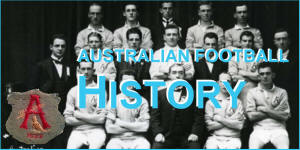
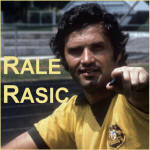
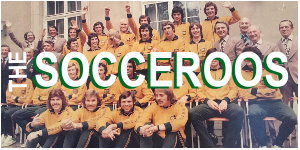
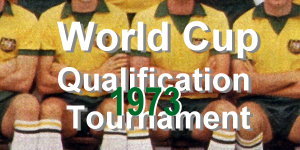 | |
| contact
thesoutherncross
after
25 years The Southern Cross got a
new design. Here it goes to the old pages
Andre Krüger TheSouthernCross
|
|
| © thesoutherncross . André Krüger™ |